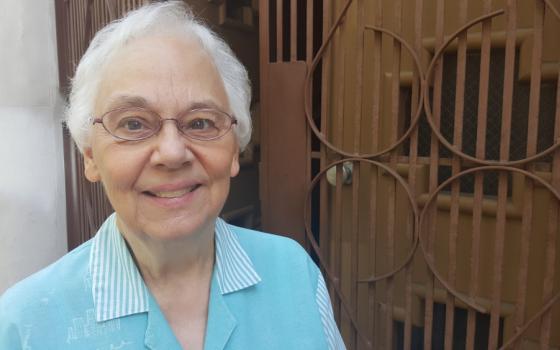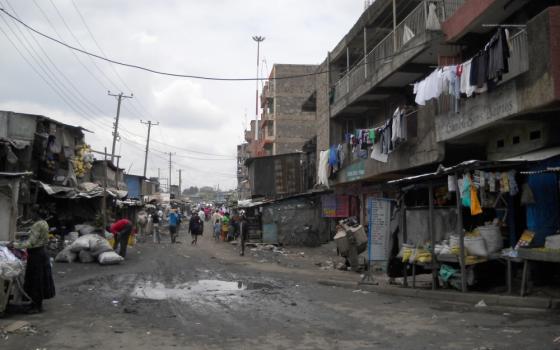For those who pay attention to the United Nations, this year is shaping up to be something of a milestone, with the last half of the year in particular taking pride of place for global significance.
"2015 is going to go down as quite a year," said Sr. Jean Stoner, who represents the Sisters of Notre Dame de Namur at the United Nations.
Three major conferences — on financing for development, sustainable development goals and climate change — take place this year, and "all are potentially very important," said Oblate Fr. Daniel LeBlanc, the U.N. representative of the Missionary Oblates of Mary Immaculate-United States Province.
What will happen in the future to tackle the worldwide problems of poverty and climate change could pivot on what happens at those three events, say Stoner, LeBlanc and others who work as advocates within the United Nations community.
That may strike some as hyperbole. But advocates argue that there is a particular urgency to global problems right now that makes the work at the United Nations worth paying attention to at this particular moment.
"It's what we do in the next 15 years that will make the greatest difference for the future," Stoner said in a recent interview.
The issues raised by these conferences are all linked; the July 13-16 financing meeting in Addis Ababa, Ethiopia, was a prelude of sorts to the September meeting about sustainable development, as world leaders discussed ways the global community can fund anti-poverty work and other efforts. The U.N.'s climate change conference will follow Nov. 30-Dec. 11 in Paris.
The Sept. 25-27 summit in New York is drawing considerable interest because U.N. member states will adopt 17 international goals about sustainable development — called the Sustainable Development Goals — that will replace the anti-poverty Millennium Development Goals that were adopted in 2000 and expire at the end of this year.
Among those attending that meeting will be Pope Francis in a highly anticipated appearance.
Many of the new goals, such as the first one — "End poverty in all its forms everywhere" — are built on the older ones. But there are potentially important new goals, such as taking urgent action to combat climate change and to "conserve and sustainably use the oceans, seas and marine resources for sustainable development."
The Addis Ababa conference was the third U.N. conference on financing for development. Its main achievement was the adoption of an agenda that will "guide policies that will mobilize financial resources, as well as the launch of new initiatives to finance the achievement of the proposed sustainable development goals, including on social welfare, access to clean energy, and greater cooperation on tax issues," the U.N. said in a statement.
U.N. Secretary-General Ban Ki-moon hailed the adopted agenda as "a major step forward in building a world of prosperity and dignity for all," adding that it "points the way for all stakeholders for smart investments in people and the planet where they are needed, when they are needed and at the scale they are needed."
However, as is often the case at U.N. conferences, nongovernmental groups — which attend parallel events to advocate tougher positions than those the U.N. member states often take — expressed keen disappointment about the final adopted document, known as the Addis Ababa Action Agenda.
The agenda "lost the opportunity to tackle the structural injustices in the current global economic system and ensure that development finance is people-centered and protects the environment," one coalition of nongovernmental and civil-society groups said. "It does not rise to world's current multiple challenges, nor does it contain the necessary leadership, ambition and practical actions."
Among other things, the coalition said, the new agreement did not "address international systemic issues in macroeconomic, financial, trade, tax, and monetary policies, while also failing to scale up existing resources and commit new financial ones." It said it was important that nongovernmental advocacy and civil-society groups "continue to be as engaged as ever to uphold the aspirations for economic, monetary and financial frameworks that respond to the imperatives of human rights and the values of humanity and solidarity."
Sr. Celine Paramunda, who represents the Medical Mission Sisters at the U.N., told Global Sisters Report, "What was most disheartening about the conference was the frustration over the non-transparent and unprincipled negotiating tactics applied by developed countries to safeguard their vested interests over the common good of the people and planet."
Nothing at the conference "commits developed countries to 'scale-up' public financing for sustainable development," she said. "Likewise absent are clear, time-bound commitments to reform or democratize the global governance of macroeconomic, financial, trade, tax, debt and monetary regimes in favor of developing countries."
The Addis Ababa meeting "did not bring about a transformational shift" that Paramunda and others had hoped for, noting, for example, that non-payment of taxes by multinational corporations and other outside groups — what she called "illicit financial flows from developing countries to developed countries" — is estimated to be up to $60 billion a year from Africa alone. Globally, it amounts to trillions of dollars.
Paramunda said the agenda "failed to give concrete commitments to ensure tax justice and equity," keeping in place the "current undemocratic and profoundly unfair status quo" that perpetuates "inequalities among countries."
"Regressive tax policies such as indirect taxes disproportionately harm people living in poverty, women, minorities, and persons with disabilities, children and other marginalized groups," she said. "Concrete commitments to implement integrated social protection systems remain vague."
The creation of an intergovernmental tax body based at the United Nations that nongovernmental groups had "pushed hard" for did not gain support among many of the U.N. member states, Paramunda said, because governments do not want to lose power and privileges over financial matters.
The advocacy groups wanted a U.N.-based body with universal membership "that could lead global deliberations on international tax cooperation, stop illicit financial flows and tackle corporate tax dodging," she said.
Sr. Teresa Kotturan, the U.N. representative of the Sisters of Charity Federation, agreed that the "bad outweighs the good" in the Addis Ababa document.
What was approved "lacks ambition" and is not "a real transformative agenda that helps meet the basic needs of all people while preserving the planet for future generations," she said. The outcome in Addis Ababa "is inadequate for the implementation of the Sustainable Development Goals."
Kotturan said she is particularly concerned about the loss of taxes not paid to developing countries.
"It's like vultures flying around dead bodies," she said in an interview. "There's a killing to be made."
LeBlanc said the results of the Addis Ababa meeting were mixed at best, though there are some reasons to be hopeful. "The fact of the matter is that more and more developed countries," including the United States, "are making efforts to help developing countries," he said.
On the other hand, “The U.N. did its very best to negate any advances beyond prior agreements, and even to reduce those. In Addis Ababa itself, I witnessed every effort being made by the U.S. representatives at the conference to control, push, threaten, especially through bad-faith negotiations," LeBlanc said. "Not nice at all, but expected."
Looking ahead to September, LeBlanc said the Sustainable Development Goals "as currently agreed to are huge in number and scope."
"In the end, it will be the people who will have to encourage their national governments to allow them to participate in planning the sustainable development strategies and work with their governments to find the ways and means to make advances a reality," he said.
In the wake of the Addis Ababa conference, "Many in civil society feel disillusioned but are still full of energy and ready to assist people at the local and national level to participate evermore on sustainable development processes," LeBlanc said. That portends at least some hope, he added.
Stoner said she believes that, too. She called the United Nations "a gospel place" — not in any formal way, but in the sense that important moral issues that are important to all of humanity are taken seriously there. And with their leadership of committees, subcommittees, forums and working groups, Catholic sisters have carved out a well-respected niche in the United Nations system.
"We present the moral dimension of the conversation," said Kotturan, noting that "there is no hidden agenda" to the concerns she and others in the NGO religious community bring to the table. "We're not there for any personal gain."
That role will help set the tone in September as the U.N. member states, and their respective leaders, meet at the behemoth headquartered on Manhattan's East Side.
"It's the only time and place all 193 nations will be together to talk about the same goals and problems," Stoner said. "You can't tackle these issues alone, and in the end, we're all affected by these problems. So, it matters."
[Chris Herlinger is a contributing writer to GSR and NCR. He has reported from South Sudan and Darfur, Sudan, as well as including Haiti, Afghanistan, Pakistan, Israel and the Occupied Territories, Kenya and Ethiopia and Liberia. He is the co-author, with Paul Jeffrey, of books on Haiti and Darfur, published by Seabury, and a third, on global hunger, will be released in September.]





